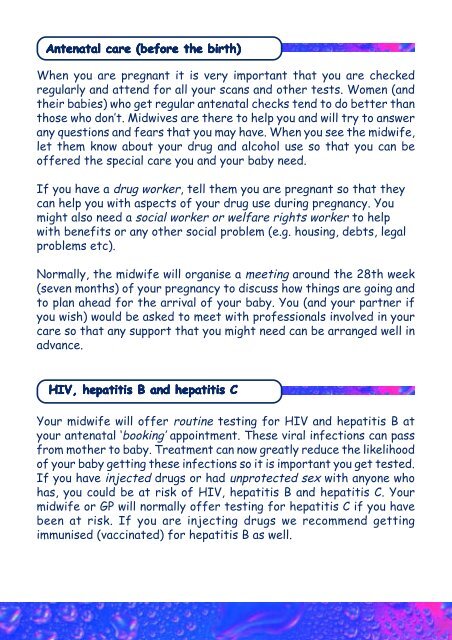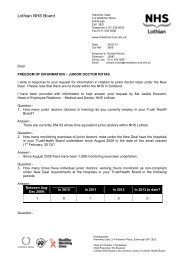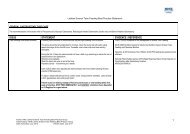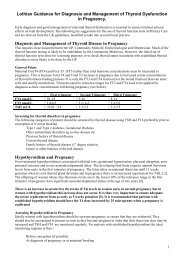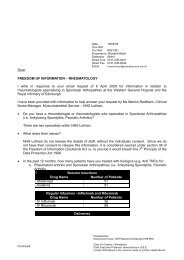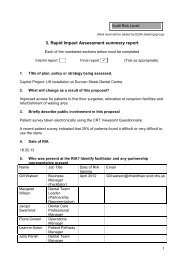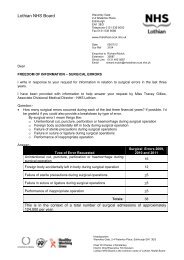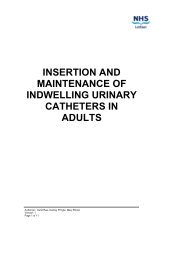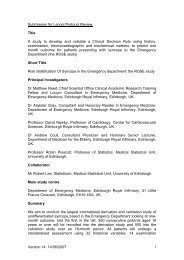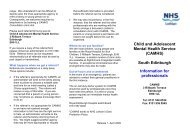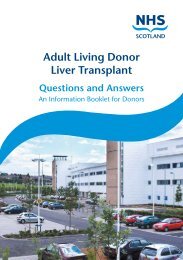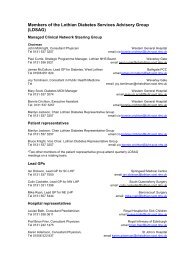Substance Misuse in Pregnancy - NHS Lothian
Substance Misuse in Pregnancy - NHS Lothian
Substance Misuse in Pregnancy - NHS Lothian
You also want an ePaper? Increase the reach of your titles
YUMPU automatically turns print PDFs into web optimized ePapers that Google loves.
Antenatal Antenatal care care (before (before the the birth) birth)<br />
birth)<br />
When you are pregnant it is very important that you are checked<br />
regularly and attend for all your scans and other tests. Women (and<br />
their babies) who get regular antenatal checks tend to do better than<br />
those who don’t. Midwives are there to help you and will try to answer<br />
any questions and fears that you may have. When you see the midwife,<br />
let them know about your drug and alcohol use so that you can be<br />
offered the special care you and your baby need.<br />
If you have a drug worker, tell them you are pregnant so that they<br />
can help you with aspects of your drug use dur<strong>in</strong>g pregnancy. You<br />
might also need a social worker or welfare rights worker to help<br />
with benefits or any other social problem (e.g. hous<strong>in</strong>g, debts, legal<br />
problems etc).<br />
Normally, the midwife will organise a meet<strong>in</strong>g around the 28th week<br />
(seven months) of your pregnancy to discuss how th<strong>in</strong>gs are go<strong>in</strong>g and<br />
to plan ahead for the arrival of your baby. You (and your partner if<br />
you wish) would be asked to meet with professionals <strong>in</strong>volved <strong>in</strong> your<br />
care so that any support that you might need can be arranged well <strong>in</strong><br />
advance.<br />
HIV, HIV, hepatitis hepatitis B B and and hepatitis hepatitis C C<br />
C<br />
Your midwife will offer rout<strong>in</strong>e test<strong>in</strong>g for HIV and hepatitis B at<br />
your antenatal ‘book<strong>in</strong>g’ appo<strong>in</strong>tment. These viral <strong>in</strong>fections can pass<br />
from mother to baby. Treatment can now greatly reduce the likelihood<br />
of your baby gett<strong>in</strong>g these <strong>in</strong>fections so it is important you get tested.<br />
If you have <strong>in</strong>jected drugs or had unprotected sex with anyone who<br />
has, you could be at risk of HIV, hepatitis B and hepatitis C. Your<br />
midwife or GP will normally offer test<strong>in</strong>g for hepatitis C if you have<br />
been at risk. If you are <strong>in</strong>ject<strong>in</strong>g drugs we recommend gett<strong>in</strong>g<br />
immunised (vacc<strong>in</strong>ated) for hepatitis B as well.


